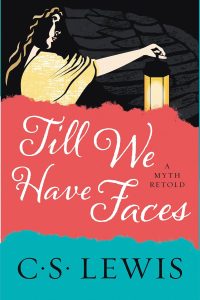 Takeaway: A story of regret and complaint, joy and pain. Much like the story of many of us.
Takeaway: A story of regret and complaint, joy and pain. Much like the story of many of us.
As regular readers of this blog well know, I have been intentionally reading a lot of CS Lewis for about 18 months. Lewis is an icon of Christian literature. And there are few that can compete with the breadth of his work, from apologetics, to memoir, to children’s literature, to serious adult fiction, to serious academic work, to contemporary essays.
I first read Till We Have Faces nearly three years ago before this most recent reading. I liked it much more this time. I think I both understand Lewis and have more context than the previous reading and I think I probably read the book better.
Till We Have Faces is a retelling of the story of Cupid and Psyche from the perspective of one of Psyche’s sisters. I didn’t really know the story of Cupid and Psyche before, and so I intentionally read several things about it before I re-read this to make sure I have the basics of the story in my head.
Books and Cuture had a good review by John McWhorter of a book on the history of jazz. The thing that has really stuck with me is McWhorter’s comments about a 1957 Looney Tune cartoon that riffed off of the three little pigs story with jazz musicians.
What McWhorter notes is that in order to understand the “Three Little Bops” cartoon, the audience had to understand the original story of the three little pigs. And similarly, when jazz was popular music, the jazz solo was riffing off of a known melody and song. But as jazz has become a more “classical form” it has taken more work to understand the original musical stories that are currently being riffed off of.

 Summary: A female crime novelist is accused of poisoning a former lover, and Lord Peter falls for her, but he has to prove she is innocent first.
Summary: A female crime novelist is accused of poisoning a former lover, and Lord Peter falls for her, but he has to prove she is innocent first. Summary: Two long lived people interact, love and fight over generations.
Summary: Two long lived people interact, love and fight over generations.
![The Wind in the Willows | [Kenneth Grahame] The Wind in the Willows | [Kenneth Grahame]](https://bookwi.se/wp-content/uploads/2014/07/61ywlehtavl-_sl300_.jpg)
 Takeaway: The gift of friends that allow us to explore and try out and explore ideas in safety and love is truly a gift that we all need.
Takeaway: The gift of friends that allow us to explore and try out and explore ideas in safety and love is truly a gift that we all need. Summary: Serious science, with humor and line drawings, what more could you want.
Summary: Serious science, with humor and line drawings, what more could you want.
 Takeaway: Sometimes in the attempt to tell a fuller story, part of the story gets lost. But the correction usually has the same problem.
Takeaway: Sometimes in the attempt to tell a fuller story, part of the story gets lost. But the correction usually has the same problem.